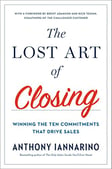Why little commitments can be better than big closes
October 11, 2017

 Whenever a potential client tells me that they believe their sales people have a “closing” problem, I can be pretty confident that the problem actually lies elsewhere. There are a bunch of reasons why the macho “always be closing” mantra no longer works in B2B sales.
Whenever a potential client tells me that they believe their sales people have a “closing” problem, I can be pretty confident that the problem actually lies elsewhere. There are a bunch of reasons why the macho “always be closing” mantra no longer works in B2B sales.
Buyers are far more sophisticated nowadays – and they are very alert to any attempts to manipulate them or to bounce them into a decision that they are not ready to make. There are a number of factors behind this, not least of which that significant buying decisions typically require the consent of a number of actively engaged stakeholders, and not just a single decision-maker.
And if the heroic close relies on a one-off, never-to-be-repeated offer, most buyers believe that the same offer (or a better one) is likely to be available next quarter, as well. They will make their decision in a timeframe that suits them, and not that of an increasingly desperate sales person…
That’s why most “closing problems” have their roots far earlier in the sales process, and often reflect a series of missed opportunities to secure their commitment to move forward with us to the next stage in their buying decision process.
MOST "CLOSING PROBLEMS" ARE ACTUALLY OPENING PROBLEMS
 In my experience, most failures to close a winnable opportunity are rooted in how the sales person opens the conversation with the prospect, how they qualify them, and how they seek to advance the opportunity from stage to stage.
In my experience, most failures to close a winnable opportunity are rooted in how the sales person opens the conversation with the prospect, how they qualify them, and how they seek to advance the opportunity from stage to stage.
I want to give credit to Anthony Iannarino for developing this theme in his excellent “The Lost Art of Closing”, in which he identifies that successful sales outcomes are usually the consequence of a series of progressive commitments on the part of the prospect.
AVOIDING AGREEABLE MEETINGS
How many times have you asked one of your sales people how their latest meeting with a prospective customer went, and heard the response that they had a “good meeting” – but when you probe them, you find that:
- The customer did not actually commit to do anything new or different as a result of the meeting
- The sales person could not identify a single piece of learning that might cause them to review their deal strategy
- Every one of the agreed actions (assuming there were any) were things that the sales person agreed to do
- At least the sales person wasn’t thrown out of the prospect’s office or the call wasn’t summarily terminated by the prospect
It’s hard to justify the conclusion that these sorts of meetings are typically anything other than a horribly unproductive waste of both the sales person and the customer’s time.
COMMITTING VALUABLE RESOURCES
Our goal – in every customer interaction – must surely be to emerge with the customer having agreed to make a commitment, no matter how small, that requires them to expend some valuable resource, whether it be their time, information, or their political capital.
And if we can’t achieve that – if we can’t be confident that a genuine exchange of value has taken place – surely we should seriously requalify whether both we and our customer should continue to pursue the opportunity.
Successful sales processes – and effective buying processes – result from a series of intentional commitments on the part of both the prospective customer and the sales person that advance both the buying process and the sales process.
NO COMMITMENT = NO PROGRESS (AND MAYBE NO DEAL)
If these commitments are not forthcoming, we should be very concerned. If our current contact is not able to make a meaningful commitment, it is likely to mean that they are not someone who can drive the project forward within their own organisation.
If they are unwilling to commit their time, it is likely that they do not regard the issue as being critical or that they do not regard us as a credible solution. If they are not prepared to introduce us to other stakeholders, they are probably either not in control or are over-controlling.
If they are not prepared to revise their thinking about what a good solution would look like in the light of the insights we have brought to them, they are likely to be either going through the motions or are treating us as “column fodder” against an already established preference.
THE POWER OF INCREMENTAL COMMITMENTS
We’re not going to turn this sort of situation around with a heroic close. By far the best way of closing a deal is for the close itself to be the cumulative consequence of a series of incremental commitments on the part of our prospective customer.
Next time you review the outcome of a sales conversation, I urge you to apply the test of “what valuable commitment did our prospect actually commit to do as a result of this interaction (and did they actually follow through)?”
Having nothing more than an agreeable conversation fails this test. Emerging with an unbalanced series of actions that are all down to us fails this test. Not learning anything that causes us to refine our opportunity strategy fails the test.
WHAT'S YOUR BEST POSSIBLE OUTCOME?
Now here’s the unfortunate thing – most sales interactions fail this test. It might be permissible for the occasional interaction to be no more than an agreeable conversation. But if the majority follow this pattern, it’s an inexcusable waste of everyone’s time.
So here’s what I urge you to do: before every significant prospective customer interaction, determine what - as a best possible outcome - you want them to commit to do. Be sure to have a fall-back, less onerous commitment in reserve.
And make sure that you earn the right to obtain that commitment from them by sharing something that is likely to be of value to them upfront. That way, you’ll have a lot fewer merely “agreeable” conversations, and many more effective ones.
And you won’t have to rely on heroic closes…
IF YOU LIKE THIS, I'M SURE YOU'LL ALSO LIKE...
- Revisiting the Buyer's Journey
- The Fundamental Principles of Value-Based Selling
- Sell the Difference!
ABOUT THE AUTHOR
 Bob Apollo is a Fellow of the Association of Professional Sales and the founder of UK-based Inflexion-Point Strategy Partners, home of the Value Selling System®. Following a successful career spanning start-ups, scale-ups and corporates, Bob now works with a growing client base of tech-based B2B-focused high-growth businesses, enabling them to systematically establish their distinctive business value in every customer interaction.
Bob Apollo is a Fellow of the Association of Professional Sales and the founder of UK-based Inflexion-Point Strategy Partners, home of the Value Selling System®. Following a successful career spanning start-ups, scale-ups and corporates, Bob now works with a growing client base of tech-based B2B-focused high-growth businesses, enabling them to systematically establish their distinctive business value in every customer interaction.


Comments